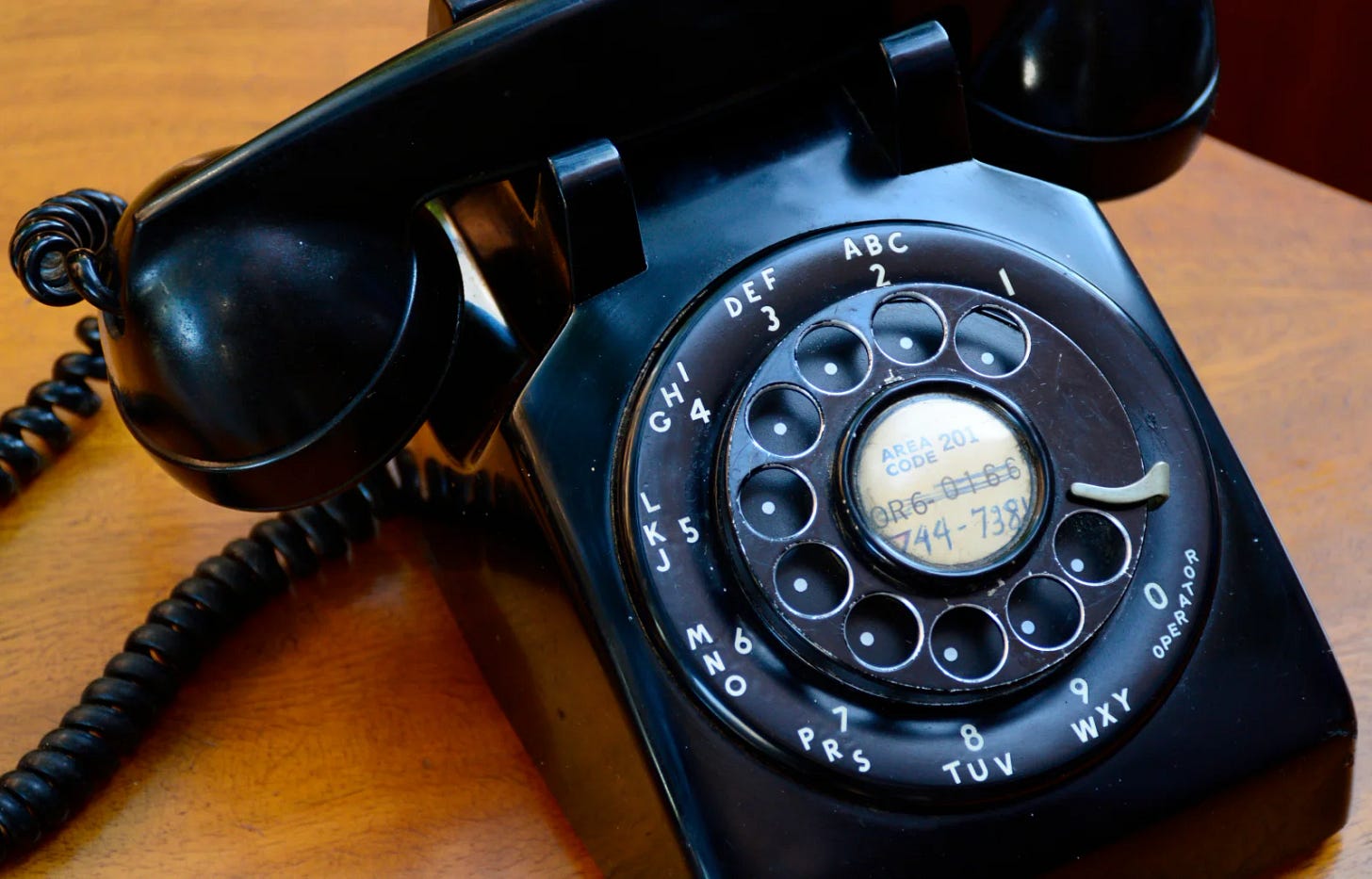Hello! Hello!
Hope everyone is well. I’m two weeks post-surgery and full of beans. Unfortunately, this is likely to be short lived as I start chemo by the end of the month. But, I’m making the most of these days, especially given the gorgeous weather in Madrid at the moment. So long walks in the park…and, some wig shopping have been on my agenda.
Not sure this is the one I will pick in the end, but who knew even chemo-related retail therapy could be such fun!
On to this week’s post, which is about something that I’m sure was once close to most of our hearts - and certainly our ears - the landline!
Hope you enjoy it, and if you do please consider becoming a paid subscriber.
Amongst the most exciting moments of my teen years was when my mother had a very long chord attached to our telephone. This meant that I could now carry the instrument from its home in the living room, to my bedroom, and close the door – well, except for the crack necessitated by the cable. Until then, a telephone conversation in our home had been a family matter. Everyone listened into each other’s calls, even making comments, and offering unsolicited advice, mid-other people’s conversations. We were well acquainted with one another’s plans and moods.
And we learned patience, to wait our turn.
What’s more, we were trained in the art of human subterfuge from a tender age. I loved picking up the phone when it rang, and would carefully repeat the name of the caller, so that my mum could hear it. She would then indicate with a smile, or a frown, whether she was available to take the call.
It was the family landline that helped me, and countless others, become adept at the artifice that is so much part of social life. When you know what is being said, even when it isn’t, or - more complicatedly - know what isn’t being said, even when it seemingly is. If this is dizzying to understand, it’s probably because you belong to the social intelligence-restricted mobile phone generation.
When children overheard adults' phone conversations, it taught them something of the nurturing work of parenting, like making doctor’s appointments, or booking swim lessons. Today, these activities have become invisible, involving quiet tapping on a keyboard, so that the awareness kids have of all parents do for them has plummeted, along with their manners.
Talking on landlines forced kids to communicate with grown-ups. Calling friends usually meant first speaking with their parents, and often involved some grown up small talk of the “Yes auntie, everything is fine at school,” variety. It allowed parents to be in touch with their children’s friends. My mother knew far more about my classmates and their state of mind and relationships, than I do about my boys’.
Today’s emphasis on children’s privacy is not an entirely bad thing. It’s a corrective to both the modern-day tendency to helicopter parent, as well as the denial of autonomy that was so much part of old-school parenting styles. Children need the space to become their own people and this space needs to be a safe one, free of the parental panopticon.
But given the many dangers that lurk on the margins of a young person’s life - bad egg-peers, internet bullies, online misinformation etc - I can’t help but wish that the family phone would make a comeback. And it’s not just about safety, which is of course chimerical. Teenagers got into all sorts of trouble back in the day without the help of mobile phones too. What its really about is bringing the family back to a less fractured, social space.
After all, if vinyl turn tables can be retro-cool, why not the landline? Apparently, a return to old-fashioned phones is already something of a trend in the United States. An article in The New York Times, quoted the owner of two newly purchased rotary phones as saying, “Talking on a landline is kind of like going to see a movie in the theater, versus watching it at home where you have distractions.”
It is obviously a more mindful exercise when all you can do on a phone is to stay physically rooted, talking to the person on the other end, instead of being on speaker phone, while ordering pizza and deleting WhatsApp messages and whatever else today’s ridiculously multitasking generation does while supposedly speaking to their parents.
Depending on a landline for communication is also an excellent exercise for memory muscles. Forget learning a new language, or the piano, or all those other things that people have started doing as a way of warding off Alzheimer’s. Just get a good old-fashioned phone and memorize all the phone numbers of people you call.
It says volumes that today, I can’t remember my own mobile phone number, although I’ve had it for over 2 years, when I can recite every friend’s landline number from my teenage years without hesitation. Dear reader, do confess, you too are far more likely to remember your best friend’s phone number from when you were 14, than the reason you wandered into the kitchen five minutes ago!
***
That’s it for today, folks. Hasta pronto y un abrazo fuerte.
Pallavi
PS: Do subscribe and spread the word too.






When my wife got breast cancer 20 years ago, she shaved her head before chemo to prevent seeing her hair fall. I did too ahead of her to get our young kids used to it. She got a wig too, but she looked so great bold that she ended going out and to work as bold as an eagle. Best to you.
Pallavi, enjoyed this very much, it’s all true, and also think of how good for the hands all that endless dialling would have been. No carpal tunnel syndrome.
My family didn’t have a landline for quite a while ( they were in some Soviet style queue for one) and one of the “social skills” my siblings and I were forced to learn was reluctantly ringing neighbours’ doorbells and bracing ourselves to ask if we could use their phone to make an urgent telephone call to a relative/friend on behalf of our parents. Nice wig but I have a feeling you will pick somit thing trendier.